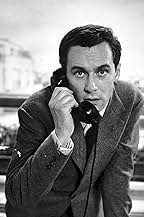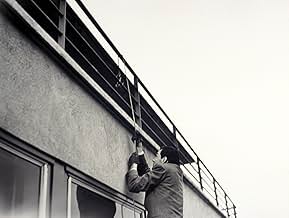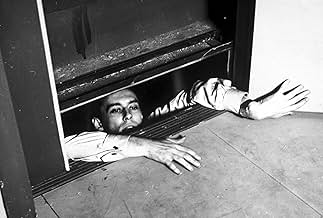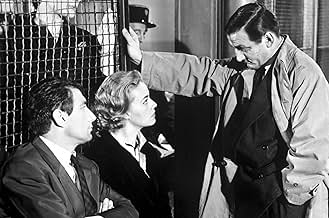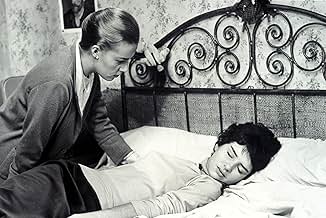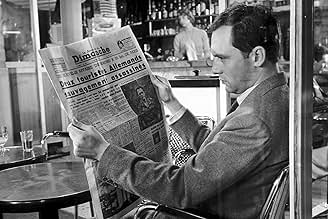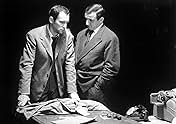Ascenseur pour l'échafaud
- 1958
- Tous publics
- 1h 31min
NOTE IMDb
7,9/10
31 k
MA NOTE
Un homme d'affaires sûr de lui assassine son employeur, le mari de sa maîtresse, et déclenche involontairement une chaîne d'événements malheureux.Un homme d'affaires sûr de lui assassine son employeur, le mari de sa maîtresse, et déclenche involontairement une chaîne d'événements malheureux.Un homme d'affaires sûr de lui assassine son employeur, le mari de sa maîtresse, et déclenche involontairement une chaîne d'événements malheureux.
- Réalisation
- Scénario
- Casting principal
- Récompenses
- 1 victoire au total
Avis à la une
10jbinfo
This film is a master piece. Miles Davis's music is superb. It is an object lesson on the art of combining sound and vision. The tension and the brooding Parisian atmosphere are heightened with cool and poignant playing. It is surprising (to the best of my knowledge) that this is the only complete original film score he produced.
The story of the crime is clever. It has reasonable human motivation and plot, and is steadily revealed. But, it is the study of 'being in the wrong place at the wrong time' that makes this film a classic. The series of chance events that will dramatically effect the characters' lives, give this film a similar feel to 'Run Lola Run' or 'Irreversible', dispute this film's linear structure and age. The dark cinematography is excellent.
I have only had an opportunity to see it once (I only just caught it because BBC4 listed it under its English title), but I would like to see it again.
The soundtrack is widely available, but I can not find the film on DVD or PAL VHS. This film should be available to a wider audience, for me, preferably in French with English subtitles.
P.S. This wonderful film is now available on DVD as part of the Louis Malle Collection: Volume 1. (Updated 11/10/2006.)
The story of the crime is clever. It has reasonable human motivation and plot, and is steadily revealed. But, it is the study of 'being in the wrong place at the wrong time' that makes this film a classic. The series of chance events that will dramatically effect the characters' lives, give this film a similar feel to 'Run Lola Run' or 'Irreversible', dispute this film's linear structure and age. The dark cinematography is excellent.
I have only had an opportunity to see it once (I only just caught it because BBC4 listed it under its English title), but I would like to see it again.
The soundtrack is widely available, but I can not find the film on DVD or PAL VHS. This film should be available to a wider audience, for me, preferably in French with English subtitles.
P.S. This wonderful film is now available on DVD as part of the Louis Malle Collection: Volume 1. (Updated 11/10/2006.)
The best laid plans seldom consider the unexpected, with the most subtle of causes, the opportunities taken, resulting in profoundly unfortunate effects. An elegantly structured piece of story telling with sound, pictures and performances raised to the rafters, this is a piece of cinema you will struggle to shear away from and, with luck, it wont leave you hanging.
10noralee
"Elevator to the Gallows (Ascenseur pour l'échafaud)" is a master work, so it's startling to learn that it was Louis Malle's first feature. It's a mother lode textbook of how-to for noir genre filmmakers as he creates his own style from what he's learned from other masters.
Malle pays tribute to the tense murder style of Hitchcock with Billy Wilder's cynicism of selfishness a la "Double Indemnity" plus Graham Greene-like, post-war politics from "The Third Man"-- and arms and oil dealers with military pasts in the Middle East are not outdated let alone adulterous lovers and rebellious teenagers.
The film drips with sex and violence without actually showing either -- sensuous Jeanne Moreau walking through a long, rainy Paris night is enough to incite both.
The black and white cinematography by Henri Decaë is breathtakingly beautiful in this newly struck 35 mm print, from smokey cafés with ever watchful eyes like ours to the titular, ironic alibi's long shafts (which surely must have inspired a key, far paler scene in "Speed") to highway lights, to a spare interrogation box, but particularly in the street scenes. The coincidences and clues are built up, step by step, visually, including the final damning evidence.
Miles Davis's improvisations gloriously and agitatedly burst forth as if pouring from the cafés and radios, but the bulk of the film is startlingly silent, except for ambient sounds like rain that adds to the tension in the plot.
The characters are archetypes -- the steely ex-Legonnaire, the James Dean and Natalie Wood imitators, the preening prosecutor -- that fit together in a marvelous puzzle. But all are cool besides Moreau's fire, as she dominates the look of the film, just wandering around Paris.
There is some dialog that doesn't quite make sense at the end, but, heck, neither does "The Big Sleep" and this is at least in that league, if not higher in the pantheon.
Malle pays tribute to the tense murder style of Hitchcock with Billy Wilder's cynicism of selfishness a la "Double Indemnity" plus Graham Greene-like, post-war politics from "The Third Man"-- and arms and oil dealers with military pasts in the Middle East are not outdated let alone adulterous lovers and rebellious teenagers.
The film drips with sex and violence without actually showing either -- sensuous Jeanne Moreau walking through a long, rainy Paris night is enough to incite both.
The black and white cinematography by Henri Decaë is breathtakingly beautiful in this newly struck 35 mm print, from smokey cafés with ever watchful eyes like ours to the titular, ironic alibi's long shafts (which surely must have inspired a key, far paler scene in "Speed") to highway lights, to a spare interrogation box, but particularly in the street scenes. The coincidences and clues are built up, step by step, visually, including the final damning evidence.
Miles Davis's improvisations gloriously and agitatedly burst forth as if pouring from the cafés and radios, but the bulk of the film is startlingly silent, except for ambient sounds like rain that adds to the tension in the plot.
The characters are archetypes -- the steely ex-Legonnaire, the James Dean and Natalie Wood imitators, the preening prosecutor -- that fit together in a marvelous puzzle. But all are cool besides Moreau's fire, as she dominates the look of the film, just wandering around Paris.
There is some dialog that doesn't quite make sense at the end, but, heck, neither does "The Big Sleep" and this is at least in that league, if not higher in the pantheon.
Louis Malle was all of 25 when he made his directorial debut with this 1958 noirish thriller that also serves as a morality play. Using the elevator of the title as a vehicle for his leitmotif, he does an admirable job of capturing the smoky gray atmosphere of Paris in the 1950's and using it to great cinematic effect on a chain-link story of deception and murder. In fact, the whole movie plays like a Francophile version of a James M. Cain novel times two with plot twists coming in quick and sometimes contrived succession. To its credit, the brief 92-minute running time trots by quickly given the multiple story lines.
The labyrinth story focuses first on illicit lovers Florence Carala, the restless wife of a corrupt arms dealer, and Julien Tavernier, a former war hero working for Florence's husband. There is not a wasted moment as they plot her husband's murder, but of course, things go awry with a forgotten piece of evidence and a running car ready to be taken. An amoral young couple, sullen and resentful Louis and free-spirited Veronique, enter the scene tangentially and get caught up in their own deceptions with a boisterous German couple whom they meet through a fender bender. The plot strands meander somewhat and eventually come together in a climax that has all the characters confronting the harsh reality of their past actions. There is a particular poignancy in the photos Florence sees at the end since we have no indication of the depth of emotion between the lovers otherwise.
Malle, along with co-screenwriter Roger Nimier, presents an interesting puzzle full of irony and chance events, but there is a periodic slackness to the suspense, for instance, Florence's endlessly despondent walk though nocturnal Paris. Jazz great Miles Davis contributes a fitting hipster score, though the music is not as big an element as I expected in setting the mood. With her sorrowful eyes and pouting intelligence, Jeanne Moreau makes a vivid impression as Florence and gives her obsessed character the necessary gravitas to make her journey worthy of our interest. Maurice Ronet effectively plays Julien like a coiled spring throughout, and it's intriguing to note how most of his performance takes place in an immobilized elevator. As Louis and Veronique, Georges Poujuloy and the especially pixyish Yori Bertin are the forerunners for the runaway pair in Jean-Luc Godard's "Breathless" replete with youthful angst and mercenary cool.
The print transfer on the 2006 Criterion Collection DVD package is wonderfully pristine. The first disc also contains the original and 2005 re-release trailers, though there is surprisingly no scholarly audio commentary track (the usual bonus for a Criterion release). The second disc, however, makes up for it with a bevy of extras starting with an extensive 1975 early career retrospective interview with Malle, a 2005 interview with an aged but still haunting Moreau, and a joint interview with the two icons and one-time lovers at the 1993 Cannes Film Festival.
Three shorts on the second disc focus on Davis's contribution - the six-minute "The Record Session" shot the night Davis and his musicians recorded the score; a remembrance piece with pianist Rene Utreger, the only surviving member of Davis's ensemble; and the celebratory "Miles Goes Modal: The Breakthrough Score to Elevator to the Gallows" where jazz trumpeter Jon Faddis and music critic Gary Giddins discuss Davis's influence over the generation of musicians to come. There is also a short by Malle set to Charlie Parker's "Crazeology" and an informative 25-page photo essay booklet.
The labyrinth story focuses first on illicit lovers Florence Carala, the restless wife of a corrupt arms dealer, and Julien Tavernier, a former war hero working for Florence's husband. There is not a wasted moment as they plot her husband's murder, but of course, things go awry with a forgotten piece of evidence and a running car ready to be taken. An amoral young couple, sullen and resentful Louis and free-spirited Veronique, enter the scene tangentially and get caught up in their own deceptions with a boisterous German couple whom they meet through a fender bender. The plot strands meander somewhat and eventually come together in a climax that has all the characters confronting the harsh reality of their past actions. There is a particular poignancy in the photos Florence sees at the end since we have no indication of the depth of emotion between the lovers otherwise.
Malle, along with co-screenwriter Roger Nimier, presents an interesting puzzle full of irony and chance events, but there is a periodic slackness to the suspense, for instance, Florence's endlessly despondent walk though nocturnal Paris. Jazz great Miles Davis contributes a fitting hipster score, though the music is not as big an element as I expected in setting the mood. With her sorrowful eyes and pouting intelligence, Jeanne Moreau makes a vivid impression as Florence and gives her obsessed character the necessary gravitas to make her journey worthy of our interest. Maurice Ronet effectively plays Julien like a coiled spring throughout, and it's intriguing to note how most of his performance takes place in an immobilized elevator. As Louis and Veronique, Georges Poujuloy and the especially pixyish Yori Bertin are the forerunners for the runaway pair in Jean-Luc Godard's "Breathless" replete with youthful angst and mercenary cool.
The print transfer on the 2006 Criterion Collection DVD package is wonderfully pristine. The first disc also contains the original and 2005 re-release trailers, though there is surprisingly no scholarly audio commentary track (the usual bonus for a Criterion release). The second disc, however, makes up for it with a bevy of extras starting with an extensive 1975 early career retrospective interview with Malle, a 2005 interview with an aged but still haunting Moreau, and a joint interview with the two icons and one-time lovers at the 1993 Cannes Film Festival.
Three shorts on the second disc focus on Davis's contribution - the six-minute "The Record Session" shot the night Davis and his musicians recorded the score; a remembrance piece with pianist Rene Utreger, the only surviving member of Davis's ensemble; and the celebratory "Miles Goes Modal: The Breakthrough Score to Elevator to the Gallows" where jazz trumpeter Jon Faddis and music critic Gary Giddins discuss Davis's influence over the generation of musicians to come. There is also a short by Malle set to Charlie Parker's "Crazeology" and an informative 25-page photo essay booklet.
A self-assured business man murders his employer, the husband of his mistress, which unintentionally provokes an ill-fated chain of events.
Journalist Barry Farrell wrote, "Moreau had 20 forgettable films behind her... Malle put Moreau under an honest light and wisely let his camera linger. The film was nothing special, but it did accomplish one thing: it proposed a new ideal of cinematic realism, a new way to look at a woman. All the drama in the story was in Moreau's face – the face that had been hidden behind cosmetics and flattering lights in all her earlier films." Farrell is certainly right about the portrayal of Moreau. How can you make a leading lady anything but glamorous? Malle found a way that was quite successful.
As for the film being "nothing special", I think Farrell is wrong. A 1950s French film noir that is well executed? This is something we need more of. Starting with a murder and then spreading out from there, this is a good story of suspense, intrigue and all that. The whole concept of being caught in an elevator is incredible, and probably unprecedented.
Journalist Barry Farrell wrote, "Moreau had 20 forgettable films behind her... Malle put Moreau under an honest light and wisely let his camera linger. The film was nothing special, but it did accomplish one thing: it proposed a new ideal of cinematic realism, a new way to look at a woman. All the drama in the story was in Moreau's face – the face that had been hidden behind cosmetics and flattering lights in all her earlier films." Farrell is certainly right about the portrayal of Moreau. How can you make a leading lady anything but glamorous? Malle found a way that was quite successful.
As for the film being "nothing special", I think Farrell is wrong. A 1950s French film noir that is well executed? This is something we need more of. Starting with a murder and then spreading out from there, this is a good story of suspense, intrigue and all that. The whole concept of being caught in an elevator is incredible, and probably unprecedented.
Le saviez-vous
- AnecdotesMiles Davis recorded the music in a single recording session while he watched a screening. He composed it while watching a rough cut and then invited a quartet of French and US musicians in a for few hours (from 11pm to 5am one night), improvising each number and allegedly sipping champagne with Jeanne Moreau and Louis Malle.
- GaffesWhen Florence arrives at the motel, the photos are just being developed - with the lights on! Exposing the prints to light before fixation would make them turn black. By the way, it's not recommended to put your hands into developer.
- Citations
Julien Tavernier: Don't sneer at war. It's your bread and butter. Indochina netted you how much? And now Algeria. Have some respect for war. It's your family heirloom.
- Bandes originalesAscenseur Pour L'Échafaud (Générique)
Composed by Miles Davis
Performed by Miles Davis (Trumpet), Barney Wilen (Tenor Saxophone), Emilhenco (as René Urtreger) (Piano), Pierre Michelot (Bass) and Kenny Clarke (Drums)
Meilleurs choix
Connectez-vous pour évaluer et suivre la liste de favoris afin de recevoir des recommandations personnalisées
- How long is Elevator to the Gallows?Alimenté par Alexa
Détails
- Date de sortie
- Pays d’origine
- Sites officiels
- Langues
- Aussi connu sous le nom de
- Elevator to the Gallows
- Lieux de tournage
- 26 Rue de Courcelles, Paris 8, Paris, France(Tavernier climbing on the upper terrace)
- Société de production
- Voir plus de crédits d'entreprise sur IMDbPro
Box-office
- Montant brut aux États-Unis et au Canada
- 374 671 $US
- Week-end de sortie aux États-Unis et au Canada
- 7 354 $US
- 26 juin 2005
- Montant brut mondial
- 431 784 $US
- Durée
- 1h 31min(91 min)
- Couleur
- Rapport de forme
- 1.66 : 1
Contribuer à cette page
Suggérer une modification ou ajouter du contenu manquant


